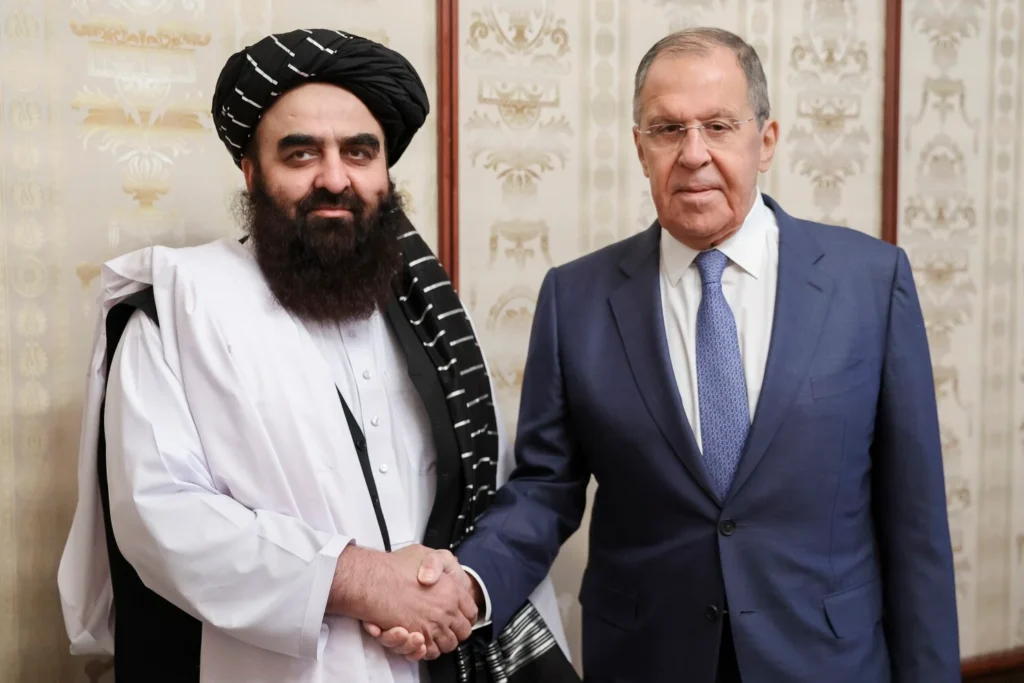Four years after the Taliban took control of Afghanistan in August 2021 after the U.S. and NATO withdrew, Russia became the first nation to publicly recognize the Taliban administration on July 3, 2025. The Russian Foreign Ministry announced the acceptance of credentials from Afghanistan ambassador, Gul Hassan. This states that the recognition would foster “productive bilateral cooperation” in areas of Security, Counter-terrorism and Economic Development. In April 2025, Russia’s gradual move in removal of the Taliban from the list of Designated terrorist Organizations. There are speculations, supported by evidence, that Russia began planning this recognition as early as December 2024, possibly before recent U.S. actions, to fill the power vacuum left by the U.S. withdrawal.
Russia Recognizes Taliban Government After Four Years
Russia’s strategic shift from informal participation to full diplomatic support is reflected in its official recognition of the Islamic Emirate of Afghanistan. In the fight against terrorism, especially against the Islamic State-Khorasan (ISIS-K), which carried out a deadly attack on Moscow in March 2024 that claimed 137 lives, Russia sees the Taliban as an important ally. President Vladimir Putin called the Taliban “allies in the fight against terrorism” in July 2024, emphasizing their role in controlling border security, refugee flows, and drug trafficking, all of which have an effect on Russia’s Central Asian allies. Following the U.S. exit in 2021, which created a power vacuum, Russia is attempting to resist Western supremacy and expand its influence in Central Asia, and this recognition is part of that endeavor. Russia has been expanding economic ties with the Taliban since 2021, including signing an international economic deal in 2022 to supply oil, gas, and wheat to Afghanistan. Formal recognition formalizes these relations, paving the way for deeper trade and security cooperation.
Early Signals and the Role of U.S. Developments
There are speculations, particularly on social media platforms like X, that Russia took proactive steps to engage with the Taliban before recent U.S. involvement, possibly to fill the power vacuum left by the U.S. withdrawal. In a significant legislative step toward official recognition, Russia’s State Duma, the lower house of parliament, approved a bill in December 2024 to take the Taliban off its list of prohibited terrorist groups. On December 10, 2024, Reuters reported that Russia had been preparing this action for months prior to the official acknowledgment in July 2025. Since the start of US President Donald Trump’s second term earlier this year, the Taliban have been aggressively advocating for US recognition. In March 2025, Washington lifted multimillion-dollar bounties on three top Taliban leaders after the group freed two American detainees. Building on Russia’s recent recognition of the Taliban, the U.N. General Assembly on July 7, 2025, adopted a resolution despite U.S. objections urging the Taliban to reverse restrictions on women and eliminate terrorist groups. While 116 countries supported the resolution, key powers including Russia, China, India, and Iran abstained, signaling a divided global stance. The move underscores growing international concern over Afghanistan’s human rights crisis amid shifting diplomatic alignments.
Future Implications
In the changing dynamics of international engagement with Afghanistan, Russia’s official recognition of the Taliban government marks a significant shift. While many nations still proceed cautiously because of governance and human rights issues, Russia’s move shows a practical strategy grounded in long-term strategic considerations and regional security objectives. While the move is largely symbolic, it has significant implications for regional dynamics, potentially encouraging other countries like China, Iran, or Central Asian states to deepen ties with the Taliban, though full international legitimacy remains elusive due to human rights concerns .

